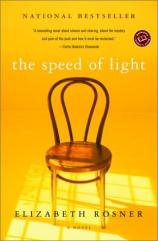The Speed of Light
Review
The Speed of Light
Elizabeth Rosner's debut novel, THE SPEED OF LIGHT, heralds a unique and beautiful new literary voice. The story of three young people haunted by the violence and sadness of the past, this novel is engaging and lyrical, despite the dark and bloody secrets it contains.
Julian and Paula Perel grew up in the shadow of the Holocaust. Their father, a Hungarian survivor of Auschwitz, was --- for the most part --- silent about the horrors he experienced and how he survived. In America, he began a career and created a family. His personal history was mysterious but obviously brutal, as obvious and brutal as the faded blue numbers on his arm.
Julian and Paula each had a very different type of relationship with their father. And they each innately interpret and express their father's past and pain in very different ways. Julian, like his father, seeks solace in science. He is a solitary and eccentric figure, living in an apartment above the one belonging to his sister, with eleven televisions and a rigid routine. Overly sensitive to his environment, Julian relies on Paula both emotionally and physically. Paula, instead of living in near silence and stillness like Julian and her father, fills the Perel house with music. In her own way Paula seeks order. A gifted classically trained opera singer, Paula, from a young age, trained vigorously, even living for years with her voice coach as a teenager. When she leaves for Europe for a string of auditions, her brother is left virtually alone.
Enter Sola Luz. Sola, a beautiful Latin American refugee, is Paula's housekeeper. Paula arranges for Sola to stay in her apartment for one month to keep an eye on Julian while she is abroad. Sola is relieved to be out of her own small, dark apartment for a while and is certainly curious about and intrigued by Julian. Sola, like Julian and Paula's father, witnessed mass murder, the destruction of her village and the loss of her family. She has carried the tragedy with her for a long time, never fully sharing her pain.
Now these three --- Julian, Paula and Sola --- in six weeks time must each face the sadness and destruction in their pasts and come to terms with it, with each other and with themselves. For Paula, the catalyst for catharsis is a trip to Hungary and the discovery of her family's history of music and her father's deepest secret. For Julian and Sola, their growing friendship and spiritual connection cause each to step beyond their self-imposed emotional and physical boundaries to begin to heal past hurts.
While THE SPEED OF LIGHT is undeniably a well-written novel, it swings frantically --- sometimes paragraph to paragraph --- between the voices of the three protagonists, so it is a bit of a challenging read. This jagged pace is alternately frustrating and entrancing. If the reader can abide the choppiness, a wonderful and poignant novel is the reward.
From the first pages of this fairly short book, Rosner packs an emotional punch. Often heartbreaking but always hopeful, THE SPEED OF LIGHT is less about the sorrows of the past and more about healing through sharing. Julian, Paula and Sola are all damaged by circumstances beyond their control. Each is burdened with a load too heavy to shoulder alone and find that by giving voice to sadness, loneliness, fear and loss, they can begin to recover and move towards happiness. Rosner presents the reader with three characters, stronger than they themselves know, at a moment of upheaval. This upheaval allows for profound transformation. The transformative journeys in THE SPEED OF LIGHT make an elegant and overwhelmingly worthwhile read.
Reviewed by Sarah Rachel Egelman on January 23, 2011
The Speed of Light
- Publication Date: April 1, 2003
- Genres: Fiction
- Paperback: 272 pages
- Publisher: Ballantine Books
- ISBN-10: 0345442253
- ISBN-13: 9780345442253










